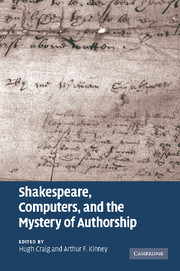Book contents
- Frontmatter
- Contents
- List of figures
- List of tables
- Notes on contributors
- Preface and acknowledgments
- 1 Introduction
- 2 Methods
- 3 The three parts of Henry VI
- 4 Authoring Arden of Faversham
- 5 Edmond Ironside and the question of Shakespearean authorship
- 6 The authorship of The Raigne of Edward the Third
- 7 The authorship of the Hand-D Addition to The Book of Sir Thomas More
- 8 The 1602 Additions to The Spanish Tragedy
- 9 Transforming King Lear
- Conclusion
- Appendix A Plays in the corpus
- Appendix B A list of 200 function words
- Glossary
- Index
- References
3 - The three parts of Henry VI
Published online by Cambridge University Press: 06 January 2010
- Frontmatter
- Contents
- List of figures
- List of tables
- Notes on contributors
- Preface and acknowledgments
- 1 Introduction
- 2 Methods
- 3 The three parts of Henry VI
- 4 Authoring Arden of Faversham
- 5 Edmond Ironside and the question of Shakespearean authorship
- 6 The authorship of The Raigne of Edward the Third
- 7 The authorship of the Hand-D Addition to The Book of Sir Thomas More
- 8 The 1602 Additions to The Spanish Tragedy
- 9 Transforming King Lear
- Conclusion
- Appendix A Plays in the corpus
- Appendix B A list of 200 function words
- Glossary
- Index
- References
Summary
We begin by approaching perhaps the thorniest problem in attribution in the Shakespeare canon, involving the three history plays dealing with the reign of King Henry VI (1422–61 and 1470–1). The early evidence about authorship is mixed. None of the three plays is mentioned among those Francis Meres listed as Shakespeare's in 1598, although it is likely they had all appeared on stage by 1592. They are all included in the 1623 Shakespeare Folio, however, which, as Michael Hattaway puts it, certainly represents an implicit claim by the editors of that volume that they are Shakespeare's work. 1 Henry VI was first printed in the Folio; 2 and 3 Henry VI had appeared in earlier editions, as The First Part of the Contention betwixt the Two Famous Houses of York and Lancaster (1594) and The True Tragedy of Richard Duke of York (1595), both anonymous, and then together in a 1619 Quarto, in which they are both attributed to Shakespeare.
A series of editors since Lewis Theobald (1733) has been convinced that Shakespeare was just one of a number of collaborators on these plays. In his Shakespeare edition of 1790, Edmond Malone denied 1 Henry VI to the poet on the grounds of its excessive use of classical allusion and its style of versification, and attributed the entirety of the text to Lodge; Greene; and the authors of Selimus, Soliman and Perseda, The Spanish Tragedy, and Titus Andronicus (which Malone thought was not by Shakespeare), as Andrew S. Cairncross reports.
- Type
- Chapter
- Information
- Shakespeare, Computers, and the Mystery of Authorship , pp. 40 - 77Publisher: Cambridge University PressPrint publication year: 2009
References
- 6
- Cited by



